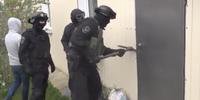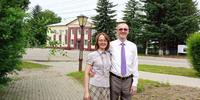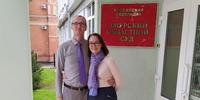Case of Moiseyenko in Zeya
Filter
- #
V. S. Obukhov, an investigator of the Investigation Department of the FSB of Russia for the Amur Region, initiates a criminal case for faith under Article 282.2 (1) of the Criminal Code of the Russian Federation against 42-year-old Konstantin Moiseenko. According to investigators, he "organized meetings of followers ... of a religious organization."
- #
Searches are being conducted in the home of Moiseenko and several other believers. Laptops, phones, personal records were seized. Moiseenko was brought in as an accused, he was taken on his own recognizance.
- #
Investigator V. S. Obukhov re-charges Moiseenko under the same article (part 1 of article 282.2).
- #
11 volumes of criminal case No. 1190710000100016 against Konstantin Moiseenko under Part 1 of Article 282.2 of the Criminal Code of the Russian Federation are sent to the Zeysky District Court of the Amur Region. Judge Alexander Kozlov scheduled the hearing for 10:00 on September 24.
- #
At least 8 searches are taking place in Zeya. According to preliminary information, criminal cases were initiated against 2 local residents for not giving up their religion. Phones and laptops are seized from believers.
At least some of those searched are witnesses in the criminal case of Konstantin Moiseenko.
Investigative actions are supervised by Konstantin Senin, senior investigator of the FSB of Russia for the Amur Region.
- #
Due to the epidemiological situation, only participants in the trial are allowed into the courtroom. As an exception, the judge allows the defendant's wife to attend this and all subsequent hearings.
The court refuses to merge the cases of Konstantin Moiseenko and Vasily Reznichenko into one. At the meeting, transcripts of video recordings of worship services are announced. On the instructions of the FSB, they were made by a woman who pretended to be interested in the Bible.
A witness is being questioned by the prosecution. He confirms that Konstantin Moiseyenko never advocated the overthrow of state power or violent change of the constitutional order, did not call for genocide and deportation of citizens on religious grounds, and did not call for any other illegal actions against them. The witness also says that the defendant never claimed the natural, biological superiority or inferiority of a person in connection with his social, racial, national, religious or linguistic affiliation.
- #
The court rejects the request to dismiss the criminal case, but attaches to the materials the resolution of the Committee of Ministers of the Council of Europe on the implementation of the judgments of the European Court in relation to Jehovah's Witnesses.
- #
The court announces the results of a religious study by expert Olga Averina. Contrary to official statements by the Russian authorities that Jehovah's Witnesses have the right to practice their religion in groups, she claims: "The very fact that meetings of followers of the religious organization Jehovah's Witnesses are held is evidence of the continuation of the activities of the [banned] organization." However, the defendant clarifies that in such an opinion lies a misleading error, since the concept of "cult" or "confession", which the Supreme Court did not prohibit, is confused with the concept of "legal entity". After all, the decision of the Supreme Court of the Russian Federation concerned the ban on only 396 legal entities registered in Russia.
- #
A prosecution witness, senior FSB operative Nikolai Korendov, is being interrogated.
He reports that the operational-search measures were carried out with the involvement of an agent, who was equipped with special equipment for audio and video recordings at the place of religious meetings, which made it possible to collect additional certificates and conduct searches.
Korendov explains that the gatherings of Jehovah's Witnesses consist of chants and Bible reading. The witness confirms that the decision of the Supreme Court of the year does not prohibit the religion of Jehovah's Witnesses in Russia.
He also says that Jehovah's Witnesses are known to him for not resorting to violence in resolving conflicts and for adhering to high moral standards.
The witness confirms that he never heard from the defendant calls for the overthrow of state power, any violence or aggression against representatives of other religions or nationalities.
In addition, the witness knows that according to the law, the Bible, its content and quotations taken from this book cannot be considered extremist.
- #
A new state prosecutor, Timur Khvaleev, enters the process.
- #
Konstantin Moiseyenko testifies in his defense.
A petition is filed to study the decisions of the ECHR regarding Jehovah's Witnesses, the Opinions of the Committee of Ministers of the Council of Europe and the working group on arbitrary meetings of the UN, the conclusions of various expert institutions on the absence of extremism in the publications of Jehovah's Witnesses and refuting the arguments of the prosecution about the danger to the state of the practice of religion of Jehovah's Witnesses.
The defendant also draws the court's attention to the opinion of the Government of the Russian Federation that the decision of the Supreme Court of 20.04.2017 does not contain a ban on professing the teachings of Jehovah's Witnesses.
The positive characteristics of the defendant, which were provided by relatives and neighbors, are attached to the case.
The next meeting is scheduled for July 2, 2021 at 09:00. Debates of the parties are planned.
- #
During the debate, the prosecutor requested a sentence of 6 years in a penal colony for Konstantin Moiseenko.
- #
The last word of the defendant Konstantin Moiseenko in Zeya - #
The Amur Regional Court of Blagoveshchensk leaves the guilty verdict unchanged: Konstantin Moiseenko was sentenced to 6 years of suspended imprisonment with a probationary period of 4 years and an additional restriction of liberty for 1 year.
- #
The Ninth Court of Cassation of General Jurisdiction in Vladivostok upholds the verdict.


